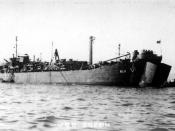Katie Cason Cason 1
Shackelford
English Honors 2 Period 1
24 October 2013
Compassion for Lack of Passion
As the King of Thebes, Creon, and his son, Haemon, enter an intense and heated argument, the Greek tragedy of "Antigone" leads into Ode Three which emphasizes young love and provides the relaxation of romance. This ode recognizes loves influence on mortals and immortals, whether it conveys a negative or positive impact. Emphasizing the negative burden love places on Haemon and Creon, the chorus informs readers of the conflict love has created between the father and son by recalling, "-you [Aphrodite] have ignited this, this kindred strife, father and son at war," (Sophocles 888-889). Aphrodite, goddess of love and beauty, is blamed for having heightened the strife since she is symbolic of love and is said to control its powers. The chorus predicts that the struggles love brings to men must bring joy to Aphrodite as she teases and mocks them with the emotions involved in this glorious passion.
Additionally, the goddess of love is suspected to revel in the manipulation of men that brings them to their downfall. Since love possesses the ability to destroy others, it is obvious that, "Love alone the victor-," remarks on the only champion being Aphrodite, seeing that her contriving ways will leave the house of Laius helpless (Sophocles 890).
To demonstrate Aphrodite's pessimistic institution of love upon the characters, the chorus's diction is equally adverse to communicate the tone. Not only is the word choice in Ode Three detrimental, but the connotation is strong and helps the audience understand the severity of the character's passion. The chorus chooses words like deathless, flee, plunderer, waste, war, strife, grip, wrench, outrage, ruin, waste, driven mad, burning, and mock. One instance that proves that the...


